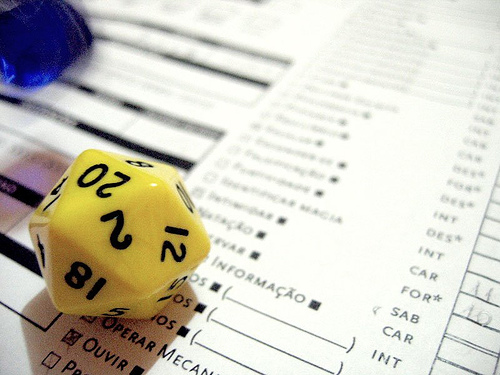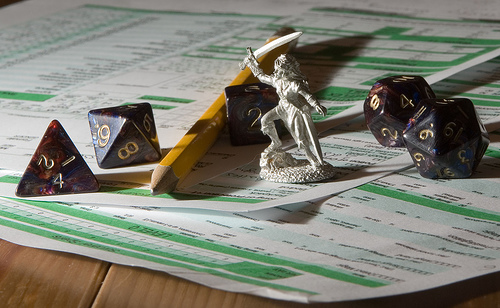 I have not talked much about D&D Next at The Iron Tavern, but I have been keeping an eye on it along the way. I liked the direction the first playtest was headed, save for a couple of small things that could easily be fixed – either through modifying the core rule or a “module”. I was eager to download the second playtest packet earlier this week when it was released.
I have not talked much about D&D Next at The Iron Tavern, but I have been keeping an eye on it along the way. I liked the direction the first playtest was headed, save for a couple of small things that could easily be fixed – either through modifying the core rule or a “module”. I was eager to download the second playtest packet earlier this week when it was released.
Before I get into this post too far, let me advise that my comments here are based solely on a read through and not an actual playtest. I am also aware that the playtest docs are trying to get the tester to play the game with these rules. In the future these rules could easily be a module and possibly not even a core assumption of the game. While I may not like some of the rules in this second playtest packet, that could be remedied by the final product by seeing the core rules simplified and other portions being moved to modules.
This post is looking at certain rules from the playtest that grabbed my attention and is not intended to be a thorough review of each rule or the playtest.
Character Creation
We have character creation rules this time! It is broken down into a fairly simple process. Ability scores are generated by random dice rolls. The totals are assigned later in the character creation process. For those that do not like such randomness a standard array of numbers to assign is also included. Point buy is obviously lacking, but I suspect this will make its way into a final release of the rules and the provided mechanisms of ability score generation are more to keep things constrained for playtesting.
Character race and class are chosen next with nothing too outside of standard choices for the playtest. Two optional rules at this point allow a player to choose a background and a specialty for their character. Background helps give you a default set of skills and a specialty provides feats and helps provide some focus for the character class you chose.
 The rest of the process is calculating your various modifiers for attack, initiative, saves, etc. This portion is clear as well. The player moves on to choosing equipment, describing your character and choosing alignment. The traditional 9 alignments players of the D&D genre are included as well as an unaligned category for creatures that it simply does not make sense to have an alignment, think something like a plant.
The rest of the process is calculating your various modifiers for attack, initiative, saves, etc. This portion is clear as well. The player moves on to choosing equipment, describing your character and choosing alignment. The traditional 9 alignments players of the D&D genre are included as well as an unaligned category for creatures that it simply does not make sense to have an alignment, think something like a plant.
Character creation is laid out cleanly in the playtest. It is easy to follow and walks you through the whole process in an orderly manner. As noted the playtest rules do lack a point-buy option that many players and groups like. I strongly suspect it will have an appearance in the final rules though, so I am not too worried about the lack of that option being spelled out.
I am not a big fan of Backgrounds or Specialties, but I will go over that in a section dedicated to those options. It is worth noting even in the playtest both of those selections are noted as optional.
Backgrounds and Specialties
Backgrounds and specialties appear to act as packages for skills, traits and feats. Backgrounds are where your character came from prior to their adventuring life and Specialties are further refining the character’s class. Backgrounds bring a bundle of skills to the table, Specialties bring a bundle of feats to the table.
While there are several of these packages to choose from, I grow hesitant with a defined template of skills or feats to choose from. Admittedly it might make a new person’s entry to the game a little easier, it strikes me as stifling creativity by needing to fit into one of these templates. New backgrounds and specialties could be created, either as officially released material or by DMs in their home campaigns, but there is still something about them that I do not like.
Backgrounds are essentially introducing a full skill list again instead of relying as much on lesser defined ability checks. Specialties are similar appearing to be adding feats again as well. By having these introduced one could likely choose skills and feats a la carte to better emulate a character truly customizing their character background or class specialty.
Classes
The major classes are represented in this playtest.
The cleric has rather weak magic and weapon attack progression and does have access to several domains that come with suggested equipment lists, grants additional weapon and armor proficiencies in some cases and other domain features.
I fear the cleric is being delegated back to a healing only type class. Perhaps some the classes spells can make up for it, but at this moment I am not seeing anything that makes me really want to play a cleric.
The fighter comes with the combat superiority feature. I like how this one starts. You get a die, a d6 at first level. This die can be used for combat maneuvers which can be gained by spending the die, i.e. trading it for a maneuver, or rolled as part of maneuver to add damage or some other effect.
 I liked the premise when I first read about this from the Wizard’s site. Unfortunately I think they will make this mechanic overly complex and I can see the beginnings of this already in this playtest packet. The framework being attached to this mechanic of only being able to use combat maneuvers you have unlocked and trading dice versus just rolling the dice. I think the overhead is too great and is going to hurt what could potentially be a really fun mechanic.
I liked the premise when I first read about this from the Wizard’s site. Unfortunately I think they will make this mechanic overly complex and I can see the beginnings of this already in this playtest packet. The framework being attached to this mechanic of only being able to use combat maneuvers you have unlocked and trading dice versus just rolling the dice. I think the overhead is too great and is going to hurt what could potentially be a really fun mechanic.
In comparison I present Dungeon Crawl Classics RPG Mighty Deed of Arms mechanic. Here too we get an extra die to roll during the attack. This die grows in size as our character levels. The results of this die get added to attack and damage and if you exceed a 3 on the damage die you can be creative as a player and perform a special move or call it a combat maneuver. The big difference is that the player can be creative! We aren’t restricted to a set of combat maneuvers that are well-defined or that the character might not have access to yet.
The rogue’s sneak attack escalates pretty quickly in the playtest packet. Some think too quickly. I have not looked at it long enough to make a call one way or the other. There is also some attempts to make the rogue truly skillful through Skill Mastery. I am one that thinks rogues should be very good at skills, it is their bread and butter. I think the rogue is one I would need to get some play time in to make better comments on.
The Wizard class is fairly typical. Certainly more Vancian magic oriented which I like to see. A nice low hit die which I am sure will make some upset. In my initial glance I do not see too much that I dislike about the wizard, though I withhold comments about spell power at this point in time.
Opportunity Attacks
I am glad to see these back in. I found the game played funny when there were not opportunity attacks. Even just bringing them in for moving out of a threatened square is a move in the right direction for me.
Long Rests
They have added a couple of variants to the amount of healing one gets for a long rest, but I am still not entirely happy with that offering either. First, the core assumption being all hit dice and hit points back after a long rest seems to be at the high end of the scale. I would rather it become an option, but maintain an assumption for more a middle ground.
The variants still seem to miss what I would consider the sweet spot for me. I would like to see a long rest for the core assumption to mean you get to roll all your hit dice and regain those as hit points and get all of your hit dice back. For example, if I have 5d8 hit dice, after a long rest I roll 5d8 and add that back to my hit point total and start the day with 5 hit dice to roll during the course of the day if I wish.
Wrap Up
I have only looked at some of the highlights from this most recent playtest packet. Frankly I need to take a closer look at the spells and bestiary before commenting on any of those. At the moment I prefer the first playtest packet to this second as some of these additions are not for the better. I will provide more in-depth commentary on the packet as a whole once I have reviewed the spells and bestiary and spent some more time looking at, and hopefully playing, with the rules as they are in this set.
